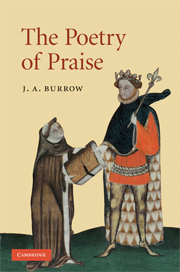Book contents
Chapter 3 - Middle English
Published online by Cambridge University Press: 22 September 2009
Summary
The great bulk and variety of Middle English verse – very great indeed by comparison with what survives from pre-Conquest times – make it hard to do any justice to the part played by praise in the poetry of that age, even if one sets Chaucer aside for separate treatment, as I do here. As in Old English, there are many long poems devoted to ‘historical’ heroes, and I shall devote the greater part of the present chapter to some of these, favouring them because, like Beowulf, their laudatory intentions have prompted discussion in modern criticism. These are poems about the past in which, as Gregory Nagy said of Homeric epic, ‘the praise takes place by the very process of narrating the deeds of heroes’. However, Nagy also speaks of a second type of praise poetry in which, as he puts it, the praise applies to the ‘here-and-now’, and poems of this type figure much more prominently in Middle than in Old English. Directly or indirectly, they address their laudes to a variety of individual subjects, male and female, human and divine, public and private, often under new influences from Latin or French writings, as in the case of love lyrics and hymns to Mary. Few of these poems have prompted modern critics to question their laudatory intentions; but I shall offer at least a sketchy account of them before turning to the ‘historical’ pieces.
- Type
- Chapter
- Information
- The Poetry of Praise , pp. 61 - 100Publisher: Cambridge University PressPrint publication year: 2008



